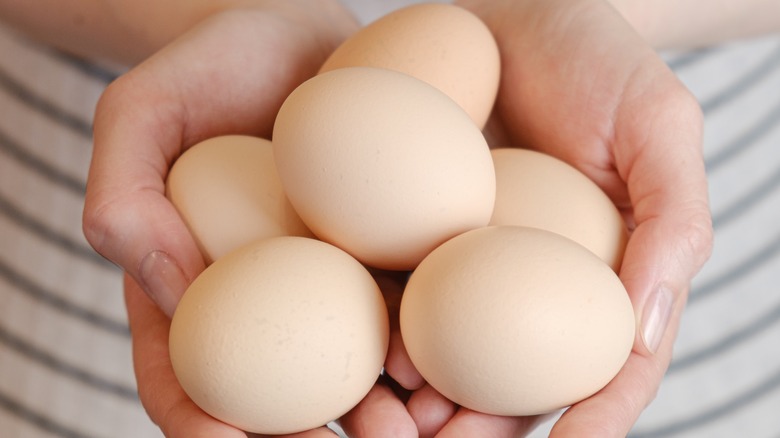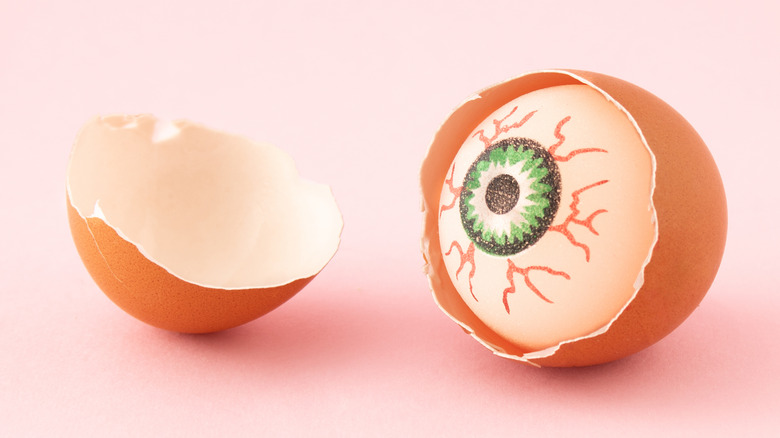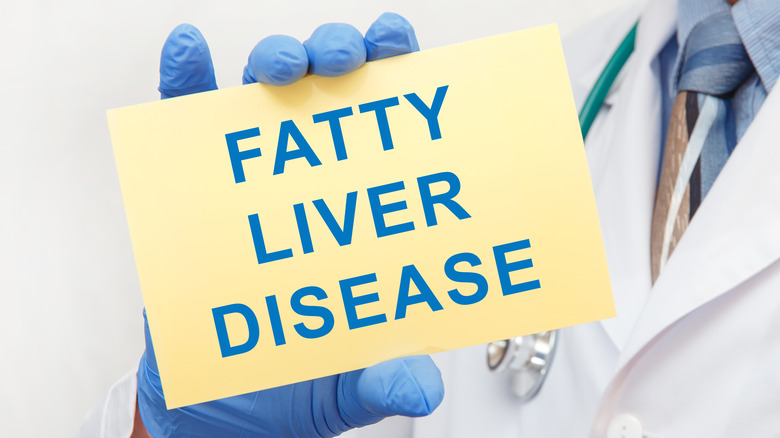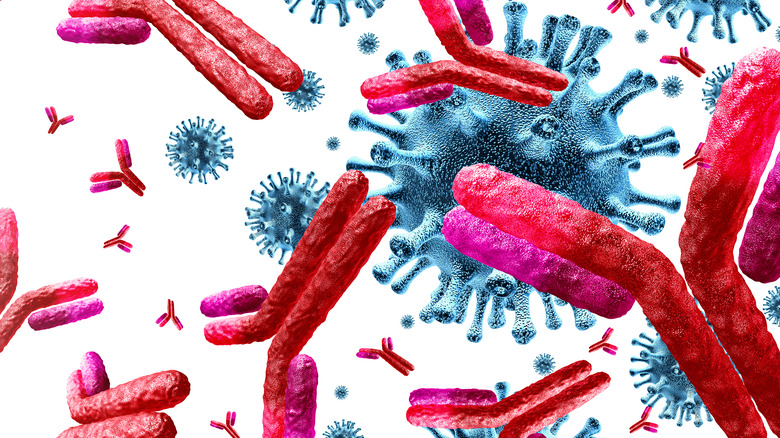What Really Happens To Your Body When You Eat Eggs Every Day
Dubbed "nature's multivitamin," the egg is a powerhouse of nutrition that's hard to beat, reports Healthline. After all, an egg supplies all the foundational nutrients needed to sustain life and growth. Notably, nearly all of these nutrients are found in the oft-maligned egg yolk, whereas the egg white is primarily a source of protein.
Per a 2018 review of studies published in the journal Cholesterol, eggs are a good source of essential nutrients that are often lacking in the Western diet, including zinc and vitamins A, D and E. Add thiamin, riboflavin, niacin, vitamin B6, folate, vitamin B12, and vitamin K to the mix, and almost all vitamins are accounted for. Minerals are plentiful in the egg as well. Apart from zinc, eggs contain calcium, iron, magnesium, phosphorus, potassium, and sodium.
Egg protein is high-quality, and may aid in weight loss by providing a greater feeling of fullness than other proteins. Studies have shown that people tend to eat less food following a meal with eggs. The egg yolk is also a good source of antioxidants and pigments called carotenoids (e.g., lutein and zeaxanthin) which are linked to a lower risk of age-related macular degeneration, cataracts, cancer, and cardiovascular diseases.
But what about the cholesterol in eggs? Read on to find out.
Eggs are good - and not bad - for your heart
Contrary to current dogma, eating cholesterol-rich eggs has very little impact on blood levels of cholesterol, via a 2019 review in Nutrients — keep in mind, though, that people who have "metabolic disorders such as diabetes, hypercholesterolemia, and hypertension" should take caution, as eating eggs could impact cholesterol levels in those cases. Moderate egg consumption (even one per day) does not increase the risk of cardiovascular diseases. Interestingly, eating eggs is linked to a lower risk of heart disease in Asian populations. According to the U.S, 2015 Dietary Guidelines, "cholesterol is not a nutrient of concern for overconsumption."
The vindication of the egg should not be surprising when you consider the critical importance of cholesterol in the body. According to Harvard Medical School, cholesterol is found in the membranes surrounding every cell in the body. Since cholesterol is essential for synthesis of cell membranes, we cannot live without it. It is also required to produce vitamin D, hormones, and bile acids for fat digestion. Most of the cholesterol in our body is made by our liver, while only about 20% is derived from our diet. A feedback loop exists wherein the body makes more cholesterol when less cholesterol is ingested, and vice versa.
Not only are eggs not bad for the heart, but they actually benefit the heart and vascular system. For example, consumption of three eggs per day for 12 weeks by adults with metabolic syndrome resulted in an increase in cardio-protective HDL cholesterol, larger LDL particles (less dangerous than small particles), and reduced insulin resistance, the hallmark of metabolic syndrome (per a 2012 study in Metabolism).
Egg protein is second to none
As explained in a 2022 review of studies published in the journal Nutrients, egg protein is the benchmark to which other proteins are compared. Among all dietary proteins, egg protein has the highest protein digestibility-corrected amino acid score (PDCAAS), a measure of protein quality. The high PDCAAS for egg protein is due to its large amount of essential amino acids, as well as its ease of digestion.
Eggs have a PDCAAS of 118% for children six months to five years old. For comparison, meat and fish score 92-94%, while cereals (e.g., rice, wheat, corn) register only 35-57%. Research demonstrates that egg protein provides a wide variety of health benefits, including improved muscle health and immune enhancement. For example, immune factors that protect the developing chick (e.g., immunoglobulin Y), along with certain enzymes (like lysozyme), can help prevent infections. A protein in egg white known as ovotransferrin can also protect against infections by binding iron needed for bacteria to grow. Additionally, ovotransferrin has been shown to have anticancer activity, and may help lower high blood pressure.
Research suggests that egg protein suppresses hunger and reduces cravings and thus aids in weight loss, per Men's Health. Three eggs pack around 18 to 20 grams of high-quality protein and can be enjoyed in many different ways, including poached, hard-boiled, scrambled, or in an extra nutritious vegetable omelet.
Eggs are muscle-friendly
While skeletal muscle is obviously essential for physical function, it has critical though often overlooked roles in metabolic health as well, notes a 2022 review (via Nutrients). Optimizing muscle health improves insulin sensitivity and lowers the risk of hypertension, cardiovascular disease, osteoporosis, and death.
High-quality animal protein such as egg protein stimulates muscle protein synthesis and inhibits muscle protein breakdown to achieve a positive protein balance and maintain muscle mass. Unlike most plant proteins, egg protein contains a high amount of leucine, the key amino acid that triggers muscle protein synthesis. However, at least four eggs at a meal are needed to meet the ~28 gram per meal protein requirement for muscle maintenance. This is especially important for older adults due to anabolic resistance, i.e., the blunted response of aging muscle to amino acids and exercise. A lesser quantity of eggs can also work if paired with another high-quality protein (like meat, cheese, or yogurt). Eggs have several features that older people can take advantage of to fight off sarcopenia, the loss of muscle mass and strength with advancing age. For example, eggs are inexpensive, simple to prepare, and made of the highest-quality protein.
Per a 2021 study in the International Journal of Sports Nutrition and Exercise Metabolism, eating the whole egg is particularly important for boosting muscle mass. The yolk contains several nonprotein nutrients with muscle-building properties. For example, omega-3 fats in the yolk enhance amino acid absorption into muscle cells and increase muscle protein synthesis.
Eggs help prevent anemia
Chronic fatigue and weakness or feeling cold all the time may be signs that you have anemia, reports the Cleveland Clinic. Anemia is common, and it occurs when the body does not have a sufficient amount of healthy red blood cells to carry oxygen to the body's tissues. Nutritional anemias include iron-deficiency anemia and vitamin B12 deficiency anemias (e.g., megaloblastic anemia).
Over the past two decades, the prevalence of anemia in the United States has risen (via a 2023 study published in the Journal of Investigative Medicine). Changes in dietary patterns that lead to iron and vitamin B12 deficiencies is a contributing factor. For example, many people are choosing white meat over red meat, which has 10 times more iron. A high rate of vitamin B12 deficiency, up to 86% among children and up to 90% among elderly, occurs in vegetarian populations (via study published in a 2013 edition of Nutrition Reviews).
Eggs are a convenient and inexpensive source of both iron and vitamin B12, per a 2019 study in the journal Nutrients. Thus, eggs can be especially helpful for vegetarians since they, unlike vegans, include eggs in their diets (via Today's Dietitian). Moreover, owing to their high protein and vitamin content, eggs have been shown to generate a steady and sustained stream of energy, particularly for people doing endurance training (via Medical News Today).
Eggs may improve your vision
Egg yolks are a great source of the carotenoid pigments lutein and zeaxanthin, notes Healthline. These same pigments are found in the macula at the center of the eye's retina.
According to a review of studies published in a 2022 edition of the journal Nutrients, lutein and zeaxanthin have been shown to slow the progression of age-related macular degeneration (AMD), cataracts, and other eye disorders. As components of the eye's macular pigment, these carotenoids act like "internal sunglasses" that protect eye tissues from light damage by filtering harmful blue light (short-wave, high energy visible light that generates highly reactive tissue-damaging free radicals). Lutein and zeaxanthin also function as antioxidants, which directly neutralize and eliminate destructive free radicals.
While dark-green leafy vegetables contain more lutein and zeaxanthin than egg yolks, the egg-derived carotenoids are more easily absorbed into the bloodstream (via a 2020 study published in Clinical Nutrition). This is due to the fats in the egg yolk, particularly phospholipids, that facilitate the absorption of the fat-soluble lutein and zeaxanthin.
Eggs improve and protect brain function
The carotenoid pigments found in egg yolk that are important for eye health (lutein and zeaxanthin) are also beneficial for brain health (via a 2018 review of studies published in the Journal of the American College of Nutrition). The retina of the eye is actually an extension of the brain, as both are part of the central nervous system. Levels of lutein and zeaxanthin in the eye correlate with levels in the brain. Both of these carotenoids have been shown to improve cognition (attention, memory, learning, thinking, perception) and reduce the risk of age-related cognitive decline. The density of the macular pigment in the eye reflects lutein/zeaxanthin status, and may potentially be used to assess cognitive function.
Eggs are also the richest dietary source of choline, an essential nutrient that supports brain health. While the body makes small amounts of choline, it is not enough to meet the body's needs; thus, dietary intake is essential. Among its functions in the body, choline is needed to make acetylcholine, a neurotransmitter that is important for learning, memory and attention. Higher intakes of choline reduce the risk of neurological birth defects, and may improve and maintain cognitive function throughout life.
In a 2017 study published in the American Journal of Clinical Nutrition, higher egg intake over a 4-year period among dementia-free men was associated with better cognitive performance in certain areas such as verbal fluency, visual attention, and task switching.
Eggs are good for your skin, nails, and hair
Eggs are one of the best foods for nourishing your skin, hair, and nails, reports Men's Health. This feature of eggs is due to their high content of sulfur which boost production of keratin, the major protein that forms skin, hair, and nails. Specifically, the sulfur provided by eggs can be used to produce the amino acid cysteine, which makes up a large part of keratin (via a 2019 study published in the Natural Medical Journal). The bonds (disulfide) between molecules of cysteine influence the physical properties of keratin. For example, a large amount of cysteine disulfide bonds makes "hard" keratin for nails, while fewer bonds make a 'softer' keratin for hair and skin.
Eggs are also a rich source of the B vitamin biotin, notes the Cleveland Clinic. Biotin helps convert food you eat into energy. Though rare in the U.S., a deficiency of biotin can adversely affect the skin, nails, and hair. Thus, many people claim that biotin strengthens thinning hair and brittle nails, while also improving the skin's appearance. However, evidence supporting these benefits of biotin is lacking.
Eggs support liver health
Eggs are a major source of choline in a person's diet. Not only does choline promote brain health, but it plays an essential role in liver function as well, reports Medical News Today.
Among its varied functions, choline contributes to methylation reactions in the body, whereby it transfers a small molecule called a methyl group to another molecule. When DNA is methylated, gene expression is altered. Since the liver is the site of most methylation reactions, choline can influence the expression of genes that regulate liver function and the development of liver diseases such as fatty liver (via a study published in a 2013 edition of Current Opinion in Clinical Nutrition & Metabolic Care).
As described in a 2019 study in Nutrients, the choline in egg yolk is attached to a phospholipid to form phosphatidylcholine, a component of the emulsifier lecithin (and the most common and best absorbed form of choline). As the primary organ for fat metabolism, the liver secretes fats in the form of very low-density lipoprotein (VLDL) into the bloodstream (via Science Direct). Phosphatidylcholine (as from egg yolk) is required for the transport of fats away from the liver. Thus, a choline deficiency may decrease the removal of fat from the liver and lead to a logjam of fat within the liver. As a result, the risk of nonalcoholic fatty liver disease (NAFLD) and its complications is increased.
Eggs boost immune function
Nutritional status plays an important role in the body's immune system response to Covid-19 and other diseases, explains a 2021 review of studies published in Frontiers in Nutrition.
Eggs are a rich source of bioactive compounds and high-quality proteins that enhance immune response via anti-inflammatory, antioxidant, and antiviral properties. For example, two proteins found in egg yolk, livetin and yolkin, have been shown to exert anti-inflammatory effects by suppressing proinflammatory cytokines (e.g., TNF-alpha) in macrophages, a type of white blood cell that engulfs and destroys microbes, cancer cells, and other foreign substances. Inflammation plays a major role in chronic metabolic conditions such as cardiovascular disease. Other proteins in eggs that can influence immune function through anti-inflammatory activity include ovalbumin, ovotransferrin, ovomucin, lysozyme, and avidin.
Eggs are also a great source of essential nutrients that promote healthy immune function, notes Medical News Today. In particular, eggs contain immune-enhancing vitamin A, vitamin B12, and selenium. Among the other numerous nutrients in eggs are omega-3 fatty acids and vitamins D, E, and K, as well as the remainder of the B vitamins.
Eggs help the body absorb nutrients
Besides enabling better absorption of its own health-enhancing carotenoids, eggs also improve the absorption of carotenoids from other foods eaten together with eggs, reports a 2015 study in The American Journal of Clinical Nutrition. Healthy young men consumed a salad of colorful mixed vegetables along with three scrambled whole eggs. Compared with consumption of an eggless control salad, co-consuming eggs and vegetables increased the absorption of carotenoids not present in eggs (e.g., alpha-carotene, beta-carotene, and lycopene) by up to eight-fold. The enhanced absorption of carotenoids when eaten with eggs was due to the rich content of phospholipids and other fats in the egg yolk.
A similar study published in a 2016 edition of The Journal of Nutrition demonstrated that eating eggs in a mixed meal also boosts the absorption of vitamin E in healthy young men. The absorption of vitamin E was ~7.5 higher after consumption of three cooked whole eggs along with a salad of mixed vegetables (a natural source of vitamin E) compared to a no-egg control. This finding is especially important, considering that close to 90% of Americans do not consume enough vitamin E to meet their requirements.
Eggs fight aging
According to Dr. Mehmet Oz, eggs are a superfood that can help you turn back the clock (via Men's Health). Among over 500,000 Chinese adults aged 30-79 years old, moderate egg consumption (up to one egg/day) was significantly correlated with a decreased risk of cardiovascular disease and death from cardiovascular disease and hemorrhagic stroke (via a 2018 study published in the journal Heart). In another population-based study, egg consumption over a 15-year period was linked to increased longevity (per a 2020 study published in Clinical Nutrition).
An egg is considered to be a "functional food" because it contains compounds that have health benefits beyond its nutrient content (via a 2015 study published in the journal Nutrients). In addition to being a rich source of vitamins and minerals, eggs contain bioactive compounds that may help protect against chronic and infectious diseases. These functional components of eggs include proteins such as phosvitin, which inhibits excessive melanin synthesis and may potentially be used to prevent hyper-pigmentation of the skin. A common method used to make functional eggs is the addition of cardio-protective omega-3 fatty acids, either directly or via supplementation of the diets of laying hens. Other functional compounds in eggs include choline, as well as the carotenoids lutein and zeaxanthin, which are linked to improved brain and eye health.












